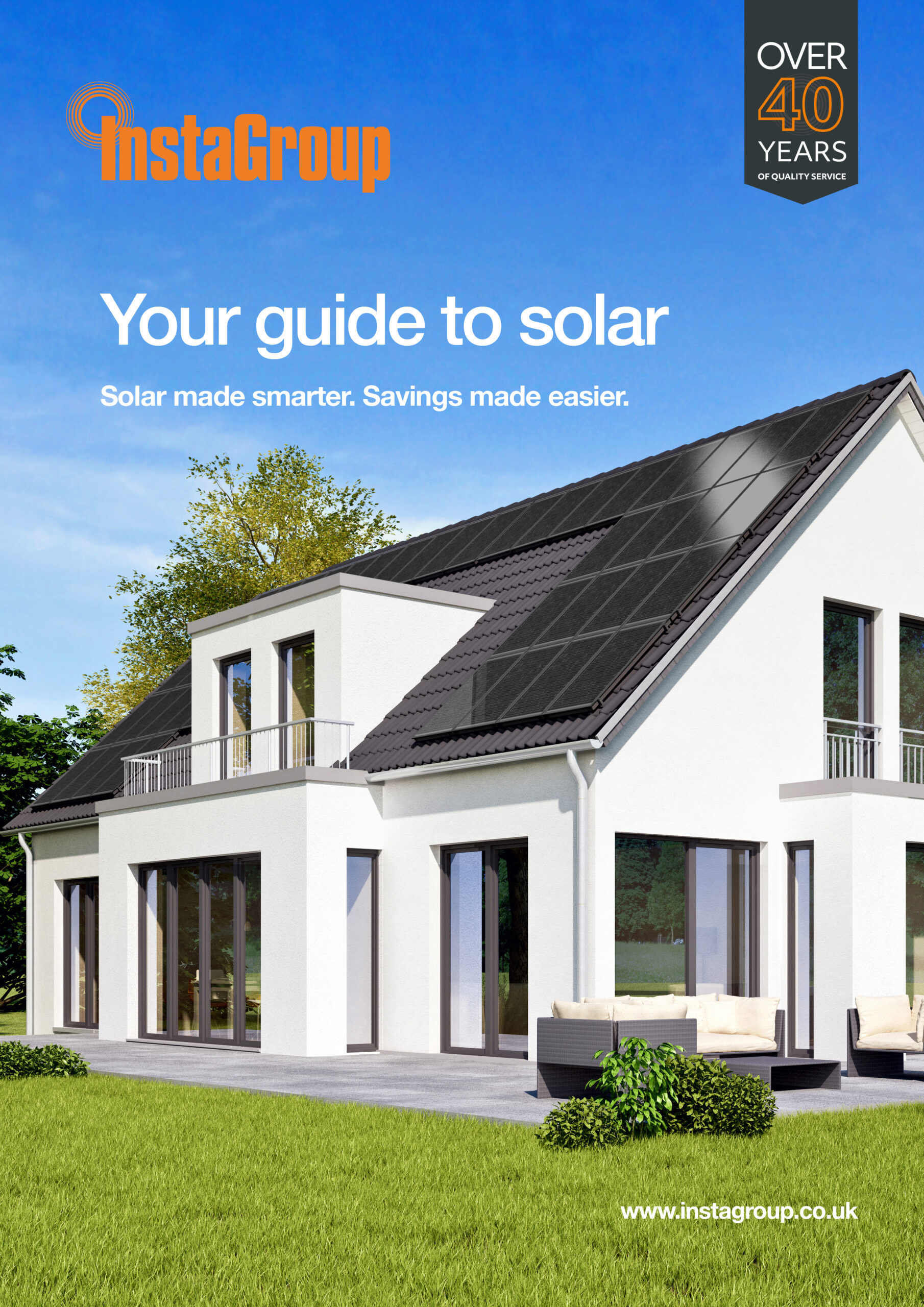Got a question? The InstaGroup experts have put together some solar energy FAQs, along with information on our other products and services.
Our solar energy FAQs cover the most common queries, from our initial survey through to installation.
Book a no-obligation survey and we can answer the questions that are unique to your home, and tell you more about the advantages of InstaGen, our all-in-one solar PV system.
How does solar PV work?
PV stands for ‘Photovoltaics’ and means converting light into electricity.
Solar panels generate DC (Direct Current) electricity from sunlight, which is fed through an inverter to convert it into AC (Alternating Current) for use in the home. The inverter is connected to your consumer unit or fuse board.
At times where solar PV generates a higher amount of electricity than can be immediately used, the excess energy can be stored in a battery or sold back to the grid. So every kilowatt your solar PV system captures through sunlight can be used.
Do solar panels work well in the UK?
Yes, the UK is very well positioned for solar power generation. UK solar generation yields compare favourably against many other countries. The UK benefits from a combination of high levels of annual sunshine, moderate temperatures, UV, low pollution, and cooling winds.
Sunlight in the right conditions is most important for a high yielding solar PV system. We provide customers with a realistic projection, at the quote stage, of what their solar installation should produce throughout the year.
How are solar panels fixed to roof? Can they cause damage?
Our expert installers and project manager will always conduct a full survey prior to works to ensure suitability of any roof or building.
We typically fit solar panels on rail systems that are mounted and fixed to the roof. We use the latest fittings, which are designed to maintain the strength and integrity of the roof, whilst being watertight.
Will shading affect the output of a solar PV system?
Yes, shading should be minimal to ensure the best return on any solar PV system. The shading analysis of an install is provided as part of our quote.
We will conduct analysis on the potential shading at any property, based on surroundings such as trees or higher buildings adjacent to your property. We also offer a range of optimisers to maximise the ability of each panel to operate at its highest performance in the event of shading.
Does roof orientation matter?
Yes, south facing roofs generally provide the highest output. However east and west facing roofs often generate similar returns and can provide high amounts of solar power.
We will produce a sun path map, bespoke to your property, to explain how much solar power generation you can expect from an installation. We will always look to achieve the best results on any project, and can offer ground mounted options for customers if a roof is not suitable.
Do I need to apply for planning permission?
For most installations that are roof-mounted and below 50kWp in total size, planning permission is not required.
Planning permission is required if your property is Listed, located in an AONB (Area of Outstanding Natural Beauty) or in a national park. Planning permission is also sometimes required for ‘in-roof’ panels. Our surveyor can check with the relevant Local Authority.
Can I stay in my home or business when an installation is taking place?
Yes, our installers will aim to cause minimal disruption to your normal routine, and will limit any time where they need to turn off the power to connect the system.
Most installs take place over 1-2 days, with installers working on the roof via scaffolding. Electrical equipment is typically installed in areas away from the most used areas of a property or business.
Are all InstaGroup installers qualified?
Yes, our expert team of installers have the relevant safety certificates, and all our installs are MCS certified.
Our work is Trustmark approved.
What is the usual payback period for a domestic solar installation?
Every system varies, but a typical payback period could be around 6-9 years for a residential solar PV install.
Adding energy storage batteries to a solar PV system provides additional benefits that create even more value, and a potentially faster payback. These include charging the batteries from the grid using cheaper energy prices at off-peak times.
What equipment do you install?
As leaders in solar technology, InstaGroup has developed InstaGen, our own all-in-one, top-rated solar PV system. Customers can trust InstaGen for quality and for the dedicated aftercare service we provide.
InstaGen is a complete system of solar panels, energy storage batteries and inverters. The equipment is high performing and has a long life.
InstaGen is available via InstaGroup's approved installers.
Why should I choose InstaGroup for solar?
Our complete premium package of solar panels, inverters and energy storage batteries sets us apart from our competitors. We can offer reassuring warranties, guarantees and technical support with InstaGen, as we have installed th e system ourselves.
We have over 14 years of experience in solar installations and have completed many domestic and commercial installations across England.
Solar technology has advanced a lot over the last 10 years – is it worth waiting?
Solar technology continues to move forward. But for most home energy needs, there has never been a better time to invest in solar power. The cost of installation has come down considerably in the last few years, and the effectiveness of solar PV systems has improved a lot since the era of the ‘Feed-In Tariff’.
InstaGroup only install top-rated equipment with InstaGen, assuring our customers of the latest in solar products and technology. This keeps homeowners relatively future-proofed compared to systems that use lower-rated or ‘cheaper’ components.
Will my project have a dedicated manager?
Yes, each solar project has an expert Project Manager who will oversee every step of the process for you. They will design an InstaGen system that offers you value for money while maximising returns from your solar PV. They can also advise you on any required Planning Permissions.
In addition, your Project Manager will make the required DNO applications (G98/G99/Grant) and MCS registrations.



